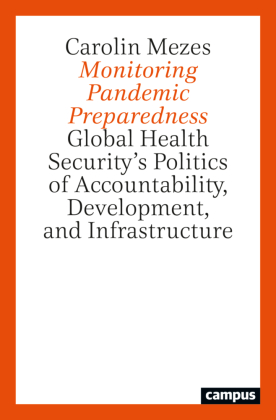How well are countries prepared for the next pandemic? And how to measure and evaluate pandemic preparedness? In this book, Carolin Mezes examines how the practice of pandemic preparedness monitoring has become an important feature of global health security governance - and how the COVID-19 pandemic has revealed its failure. By way of document analysis and an ethnographic case study of the Joint External Evaluations, her study considers the well-rehearsed critique that preparedness monitoring cannot »predict« pandemic response performance and appears as a hollow paperwork exercise of box-ticking. An analysis of the media-technologies of preparedness monitoring gives nuance to these critiques and allows us to understand how preparedness monitoring gets caught up in the (contradictive) goals of objective knowledge production, soft-law accountability, and infrastructural development. Considering the power relations of global health, her research scrutinizes the infrastructural politi
cs of preparedness monitoring and the modernism inherent in this developmental effort.Wie gut sind Länder auf die nächste Pandemie vorbereitet und wie misst und evaluiert man sogenannte Pandemic Preparedness?In diesem Buch untersucht Carolin Mezes wie die Praxis des Monitoring pandemischer Preparedness zu einem wichtigen Bestandteil der Goverance globaler Gesundheitssicherheit wurde - und wie die COVID-19 Pandemie das Scheitern dieser Praxis sichtbar machte. Mittels Dokumentenanalyse und einer ethnographischen Fallstudie der Joint External Evaluations diskutiert ihre Studie die Kritik, dass Preparedness Monitoring nicht »vorhersagen« kann, wie Länder auf einen pandemischen Notfall reagieren können und als nur oberflächliche Verwaltungsübung zu verstehen ist. Eine Analyse der Medientechnologien von Preparedness Monitoring nuanciert diese Kritik und erlaubt uns zu verstehen wie sich Preparedness Monitoring in seinen verschiedenen Zielen verfängt: der Produktion objektiven Wissens, e
iner »soft-law« Rechenschaftspraxis, sowie der Gestaltung infrastruktureller Entwicklung. Mit Blick auf die Machtverhältnisse des Feldes globaler Gesundheit befragt ihre Forschung die Infrastrukturpolitik von Preparedness Monitoring und den Modernismus, der diesem Entwicklungsvorhaben innewohnt.

























